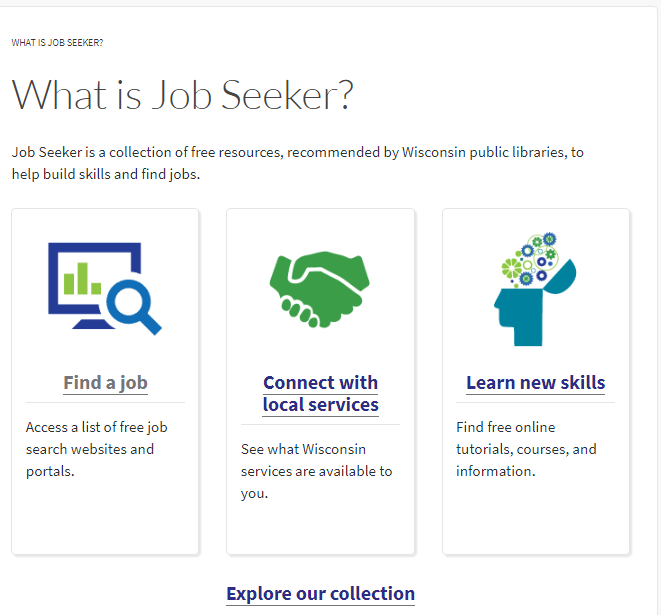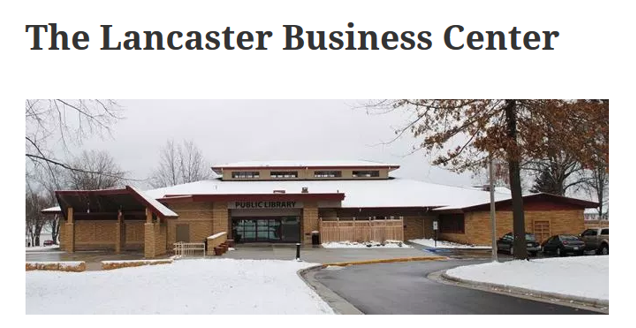Wisconsin Partner State in IMLS-Funded Reimagining School Readiness Training
Wisconsin will take part in a three-year project with the Bay Area Discovery Museum (BADM) to support early learning in public libraries for children ages 0-8 and their families. The efforts in Wisconsin will be led by Tessa Schmidt, Youth and Inclusive Services Consultant on the Public Library Development Team. For details about the project, read on for the press release from BADM.

National Expansion of the Bay Area Discovery Museum’s Reimagining School Readiness Toolkit Will Impact 51,000 Children and Adults in Three Years
July 25, 2019 / Bay Area Discovery Museum, Press Releases / Featured
A grant from the Institute of Museum and Library Services will support the expansion
Sausalito, CA – The Bay Area Discovery Museum (BADM) is pleased to announce plans to expand its Reimagining School Readiness Toolkit (Toolkit) on a national level. Scaling the Toolkit in this way is possible thanks to a $245,721 grant from the Institute of Museum and Library Services (IMLS) awarded to the Pacific Library Partnership (PLP), which, along with the California State Library (CSL) is partnering with BADM on this work. As a result of the grant, the Toolkit will expand to 18 states over three years.
The Toolkit’s resources—including implementation tips and strategies for librarians, and take-home activities for families—are based on research from Reimagining School Readiness, a position paper with key findings published by BADM’s in-house research department. This research was generously supported by the Thomas Murphy Fund at the San Diego Foundation. Following the paper’s publication, the Toolkit was developed by BADM with generous support from CSL, to equip librarians throughout California with the resources they need to help families prepare children ages 0-8 for success in school and in life.
“At the Bay Area Discovery Museum, we believe that providing children with high-quality learning experiences is the best investment society can make,” said Karyn Flynn, CEO of BADM. “The Toolkit empowers librarians to support children and families in building key early learning skills through fun, everyday activities that can happen at the library or at home. With the success of the Toolkit thus far, we are excited to see how it will continue to impact families in California and across the country.”
In scaling the Toolkit for a national network of libraries, PLP, BADM, and CSL will rely on lessons learned from piloting the Toolkit in California. From 2016-2018, BADM and CSL worked closely with six California libraries, representative of rural, urban, and suburban communities, to refine and rollout the Toolkit. Staff members from each library worked together to conceptualize and provide feedback on the components that would be in the final Toolkit. These components include a set of resources specifically created for the library staff, as well as downloadable content—bookmarks with tips for parents, a poster with family conversation starters, daily math activities, and more—in six languages that library staff can distribute to families.
“The Pacific Library Partnership is very excited to work with BADM and CSL to expand the Toolkit nationwide,” said Carol Frost, CEO of PLP. “Libraries already support the cognitive, emotional, and social growth of a child through programs and resources, and teaching more librarians within California and throughout the United States will benefit librarians and children, and make for stronger communities.” PLP will specifically support the Toolkit’s rollout by managing stipends to support training at libraries nationwide, as well as connecting with library networks nationwide to raise awareness for this project.
More than 50 percent of 4-year-olds across the nation remain unenrolled in public preschools. There is a clear opportunity for libraries, which are safe, accessible, and trusted spaces in the community, to serve families by providing critical, research-backed early learning experiences. Through its “train-the-trainer” model, the national rollout of the Toolkit will empower more than 1,200 individual librarians to reach more than 51,000 children and adults in this way.
During the pilot period, there were repeated requests for in-person trainings and additional workshops from libraries throughout California, as well as from other states across the U.S. With PLP’s receipt of the IMLS grant, BADM, PLP, and CSL have the support needed to implement a three-year national rollout of the Toolkit, and will be able to train librarians across the country to feel confident talking about the research behind their programming and designing new programming based on the observed needs of the communities they serve.
A staff member from Ovitt County Family Library, one of the six pilot libraries in California, put it this way: “[The Toolkit] helps me be better at my job, which helps the profession, which helps the community. I think the ripple effect long term, it’s going to be great.”
In Year One, 50 librarians from each of three new partner states—Arizona, Kentucky, and Wisconsin—will receive training on the existing Toolkit. A subset of these librarians, in addition to librarians who have been using the Toolkit in California, will participate in an evaluation to assess the Toolkit’s impact. These evaluations will also allow BADM staff to refine the Toolkit to ensure it is as effective as possible for as many librarians as possible across the country. In Year Two, 20 library staff from 10 states—all four of the Year One states and six new Year Two states—will be trained as trainers, who are then responsible for training additional library cohorts in their states. In Year Three, 16 library staff from eight new states will be trained as trainers, and will be responsible for training library cohorts in their states.
Currently, children who are unable to attend preschool start Kindergarten behind, and are at a disadvantage to their peers for whom preschool is accessible. BADM, CSL, and PLP are excited to train trusted members of the community—library staff—on the research behind successful school readiness, and to provide them with the Toolkit so that they can share its easy-to-implement strategies and actionable tips with the families who need it most.
BADM as an institution is grateful to IMLS for demonstrating its support of this project by awarding PLP a $245,721 grant for this effort, and looks forward to providing impactful, early learning experiences to more children and families across the country.
About the Bay Area Discovery Museum
The Bay Area Discovery Museum is a children’s museum in Sausalito that applies the latest research to develop early learning experiences that inspire and build creative problem-solving skills in children, transforming the way they learn and the way they contribute to the world. As a 501(c)(3) nonprofit organization, the museum provides STEM-focused, inquiry driven experiences that develop creativity and conceptual thinking, critical components of problem solving. BayAreaDiscoveryMuseum.org
About the California State Library
Founded in 1850, the California State Library has an extensive collection of document from and about the state’s rich history, ranging from books, maps, miners’ diaries, newspapers, and periodicals to photographs, paintings and posters. The State Library also holds federal and state publications, and is home to the Bernard E. Witkin State Law Library, and the Braille and Talking Book Library. Library.CA.gov
About Pacific Library Partnership
The State of California is divided in 9 cooperative library regions. The Pacific Library Partnership (PLP) is comprised of the 8 counties in the San Francisco Bay Area and includes 42-member library jurisdictions: 31 public and 9 academic institutions. PLP’s role is to work with the State Library on funding initiatives and to provide value to member libraries through grants, innovation, collaboration and training. PLP capitalizes on the talents and competencies of a larger group of member library staff and increases the opportunity to share and learn from each other. The libraries collaborate to invest in research and development of new initiatives and pool resources to support development of these initiatives.
###



